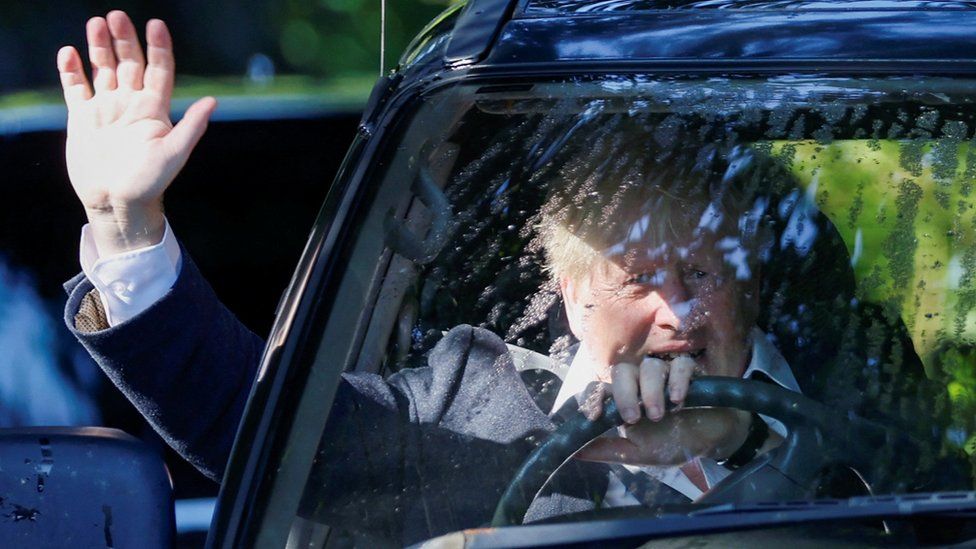ARTICLE AD BOX
 Image source, Reuters
Image source, Reuters
By Paul Seddon
Politics reporter
Boris Johnson has stood down as an MP, ahead of a report expected to accuse him of misleading Parliament over the Partygate scandal.
But he will still be entitled to a number of perks - most of them related to his role as a former prime minister.
Here's a breakdown of what he can expect in his life outside the House of Commons.
MP and ministerial pay
He will lose his annual MP salary of £86,584 - but he's unlikely to be short of a bob or two, having earned around £6m since standing down as PM last September, mainly from speaking engagements.
He's entitled to both an MP and ministerial pension at some point, which are administered under different schemes.
He would also have been automatically entitled to a severance payment of around £19,000 when he left Downing Street.
Winding up costs
As a former MP, he will be able to claim for costs incurred in leaving Parliament, including closing down constituency offices.
But he won't be able to claim the separate payment available to MPs leaving at a general election, equal to two months' net pay, or around £9,800.
And he won't be able to claim the loss-of-office payment for those who lose their seat at an election, which averaged £5,250 after the 2019 poll.
Personal security
Former prime ministers continue to receive publicly-funded security from specialist police protection officers.
They are also entitled to an official chauffeur-driven government car.
Image source, Getty Images
Image caption,Boris Johnson has been hitting the speaking circuit since leaving Downing Street
Legal representation
Former ministers are entitled to public funding for legal support if they are sued over decisions they took whilst in government. This does not apply for "personal" actions against them, for example if they are sued for libel.
As a former minister, he would normally be expected to receive taxpayer-funded legal help for his evidence to the ongoing Covid inquiry.
Documents submitted to the inquiry show that he was receiving support from the government's in-house legal department, but he cut ties with them in May after being referred to police for potential rule breaches during the pandemic.
Shortly afterwards, he said he was "instructing new solicitors" but this was dependent on funding being agreed with the Cabinet Office.
The department, however, has since said he won't get funding if he tries to "undermine" the government's position in relation to the inquiry, amid a row over the submission of his unredacted WhatsApps.
Annual PM allowance
All former prime ministers since John Major have been entitled to a yearly £115,000 allowance to support their "special position in public life".
They can claim from it to fund things like running an office, paying for staff, and travel to events where they are appearing as an ex-PM. The money can't be used to support private or parliamentary duties.
It is not yet known whether Mr Johnson has claimed it since leaving No 10, as the most recent annual figures are yet to be published.
Former premiers have not always claimed the full amount. It is not paid automatically, and they have to provide receipts.
In addition, they can claim up to 10% of the yearly allowance to put towards the pensions of their staff.
Parliament pass
As a former MP, Mr Johnson will be able to apply for a parliamentary pass giving him continued access to the Parliamentary estate.
The so-called former member's pass, formerly known an "X" pass, gives access to certain parts of the buildings and some of the catering facilities.
Former MPs are not allowed to use the pass to help with "lobbying" - or trying to influence - government ministers.
Privy Council
He will also remain a member of the Privy Council, the body that meets around once a month to get the monarch's formal approval for government orders approved by ministers.
There are several hundred privy councillors, although only current members of the government are involved in day-to-day business.
All cabinet ministers, including prime ministers, are appointed for life.
The only prime minister to have been removed from the list of privy councillors was short-lived premier William Cavendish, who was struck off by King George III when he suspected him of plotting against him.

 1 year ago
55
1 year ago
55








 English (US) ·
English (US) ·